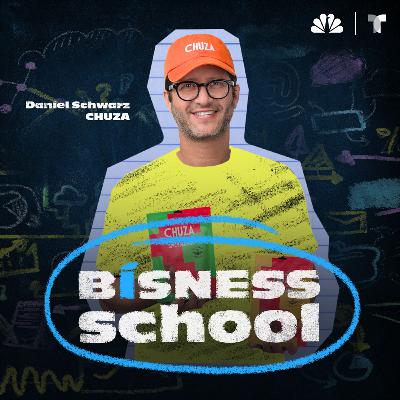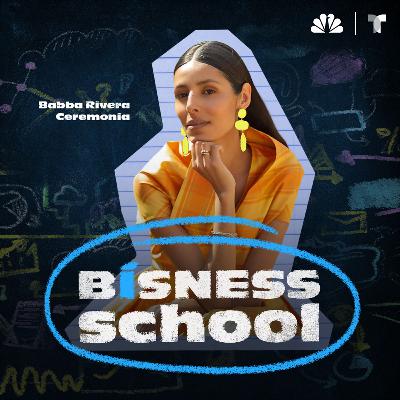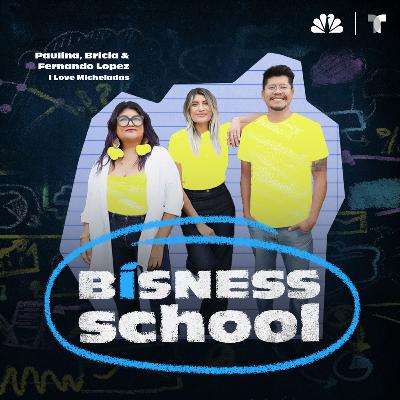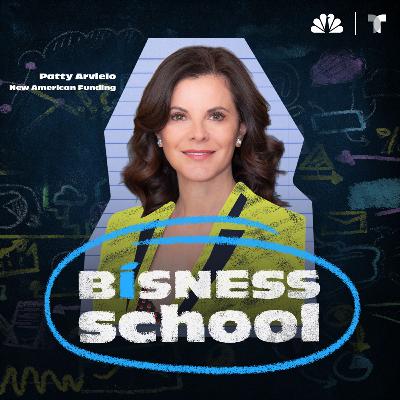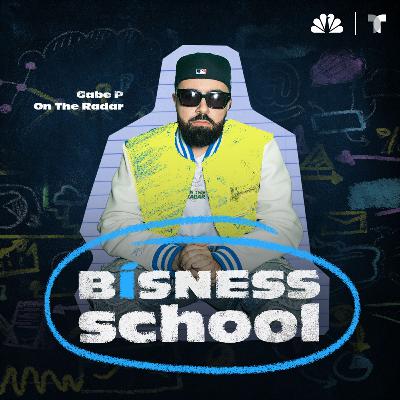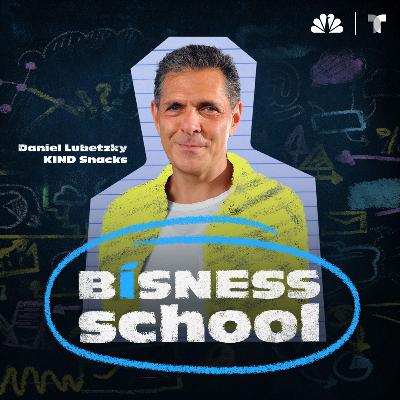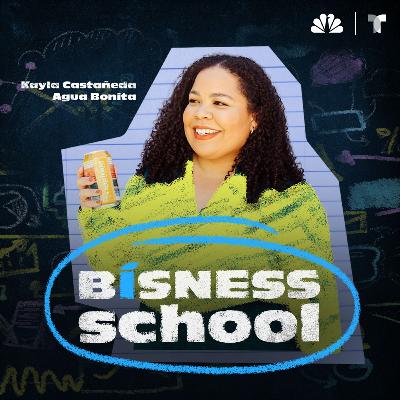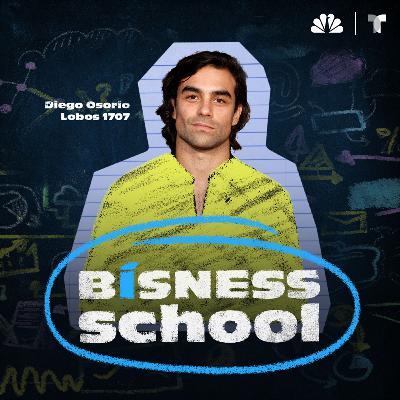Discover Bísness School
Bísness School

Bísness School
Author: NBC and Telemundo
Subscribed: 5Played: 8Subscribe
Share
© NBC
Description
Did you know Latinos are the fastest-growing group of entrepreneurs in the United States? In Bísness School, NBC and Telemundo join forces to tell the stories of some of the most inspiring Latino founders. NBC and Telemundo highlight business owners across all industries, from entertainment to publishing and food. It sounds like business school, but it’s not. You can think of Bísness School as a lowercase MBA with uppercase guests. And while business school is expensive, Bísness School is free. Look out for new episodes every other Tuesday.
Season 3 Host: Ashley Chaparro
Season 1-2 Host: Fernando Hurtado
Season 3 Host: Ashley Chaparro
Season 1-2 Host: Fernando Hurtado
34 Episodes
Reverse
Daniel Schwarz joins Bísness School to share what he learned from launching his first company in Mexico, how he bounced back when his co-packer disappeared just before launch, and the story of how an “empty booth” at Expo West became his golden ticket to some of the nation’s biggest retailers.This episode was produced by Miguel Estrada.It was edited by James Jeffrey Follow Chuza at @chuzasnacks Follow Ashley Chaparro at @ashleychaparro23. Hosted by Simplecast, an AdsWizz company. See pcm.adswizz.com for information about our collection and use of personal data for advertising.
Ceremonia founder Babba Rivera joins Bísness School to discuss her journey from launching ByBabba to making history as the first Latinx-owned hair care brand at Sephora, and how she proved investors wrong about the strength of the Latinx market. This episode was produced by Miguel Estrada.It was edited by James Jeffrey. Follow Ceremonia at @myceremonia.Follow Babba Rivera at @babba. Follow Ashley Chaparro at @ashleychaparro23. Hosted by Simplecast, an AdsWizz company. See pcm.adswizz.com for information about our collection and use of personal data for advertising.
Loisa co-founder Kenny Luna joins Bísness School’s Ashley Chaparro to share why he left his job in data analysis to launch his own business, how micro-influencers played a key role in Loisa’s early growth, and how a national boycott helped propel the brand into one of the most beloved names in adobo and sofrito. This episode was produced by Miguel Estrada.It was edited by James Jeffrey. Follow Loisa at @eatloisaFollow Ashley Chaparro at @ashleychaparro23. Hosted by Simplecast, an AdsWizz company. See pcm.adswizz.com for information about our collection and use of personal data for advertising.
“I Love Micheladas” founders Paulina, Bricia, and Fernando Lopez join Bísness School’s Ashley Chaparro to share how a magazine article sparked their michelada brand, how they landed in Costco, and how they manage to run a family business. This episode was produced by Miguel Estrada.It was edited by James Jeffrey. Follow I Love Micheladas at @ilovemicheladas.Follow Ashley Chaparro at @ashleychaparro23. Hosted by Simplecast, an AdsWizz company. See pcm.adswizz.com for information about our collection and use of personal data for advertising.
New American Funding co-founder Patty Arvielo joins Bísness School host Ashley Chaparro to discuss how her Latina identity motivated her to become and entrepreneur and how social media has played a role in creating a business legacy. This episode was produced by Miguel Estrada.It was edited by Ashley Chaparro. Follow Patty Arvielo at @pattyarvielo. Follow Ashley Chaparro at @ashleychaparro23. Hosted by Simplecast, an AdsWizz company. See pcm.adswizz.com for information about our collection and use of personal data for advertising.
On The Radar founder Gabe P joins Bísness School host Ashley Chaparro to discuss what he learned from Puerto Rican-American radio producer Angie Martinez, why he decided to take a chance on 'drill' music, and how he secured a collaboration with Drake and Central Cee for one of his most-watched freestyle videos.This episode was produced by Miguel Estrada. It was edited by James Jeffrey.Follow Gabe P at @gabepnyc.Follow On The Radar at @ontheradarradio.Follow Ashley Chaparro at @ashleychaparro23. Hosted by Simplecast, an AdsWizz company. See pcm.adswizz.com for information about our collection and use of personal data for advertising.
Kind Healthy Snacks founder Daniel Lubetzky joins Bísness School host Ashley Chaparro to discuss the influence of his father in developing his entrepreneurial spirit, the business lessons he learned from launching his first company and the qualities he looks for when investing in a business. This episode was produced by Miguel Estrada.It was edited by James Jeffrey. Follow Ashley Chaparro at @ashleychaparro23. Hosted by Simplecast, an AdsWizz company. See pcm.adswizz.com for information about our collection and use of personal data for advertising.
When Kayla Casteñeda was a child, she spent several days at her grandparent's house in Central California — where she learned how to prepare “aguas frescas” with the ripe fruit that her grandfather, a farmworker, collected from the fields. “Agua fresca,” which literally translates to “fresh water,” is a popular type of beverage in Mexico and Latin America. The drink is made from an array of fruits, flowers or seeds blended with water and sugar. In the middle of the pandemic, Castañeda decided to honor her family’s heritage and created Agua Bonita, a brand of canned aguas frescas that contain 80% less sugar than the traditional Latin American drinks. Today, Agua Bonita is a full-fledged business that is available in more than 1,000 stores across the country, including Walmart.This episode was produced by Miguel Estrada. It was edited by Ashley Chaparro.Follow Kayla Castañeda at @so.fresca.so.clean.Follow Ashley Chaparro at @ashleychaparro23. Hosted by Simplecast, an AdsWizz company. See pcm.adswizz.com for information about our collection and use of personal data for advertising.
Tequila has become one of the favorite spirits in the U.S. So much so that according to the Distilled Spirits Council of the United States, the consumption of the iconic Mexican beverage has grown 294% since 2003. The industry is so competitive that when Spanish American actor Diego Osorio decided to venture into the spirits world, he knew he needed to distinguish himself from other brands, so he launched Lobos 1707, a tequila brand inspired by his family that blends Mexican and Spanish aging techniques in its portfolio. Today, Lobos 1707 products are available in BevMo and Total Wine Stores across the country. Diego Osorio joins Bísness School to tell us how his acting career inspired him to become an entrepreneur, how a family discovery shaped Lobos 1707 and how an unexpected phone call from NBA legend LeBron James helped him launch his business in the middle of the COVID-19 pandemic.
This episode was produced by Miguel Estrada.
It was edited by James Jeffrey.
Follow Lobos 1707 at @lobos1707.
Follow Ashley Chaparro at @ashleychaparro23. Hosted by Simplecast, an AdsWizz company. See https://pcm.adswizz.com
for information about our collection and use of personal data for
advertising.
If somebody could name a quintessential symbol of Mexican gastronomy, that ingredient would be salsa. Whether it’s hot sauce, salsa verde or habanero, salsas help enhance the flavor of many Mexican traditional recipes by adding depth, and most commonly, spice to the food. So when Hector Saldivar moved from Mexico to CA, he realized salsa options at U.S. grocery stores didn’t resemble the flavors he was used to growing up in Monterrey. Inspired by his mother’s traditional recipes, Hector decided to launch Tía Lupita, a brand of healthier Mexican-inspired food products that includes hot sauces, tortilla chips, tortillas, and salsas. Today, Tía Lupita products are available in over 4,000 retail locations across the country, including Whole Foods, Target and Walmart. This episode was produced by Miguel Estrada. It was edited by James Jeffrey.Follow Tía Lupita Foods at @tialupitafoods.Follow Ashley Chaparro at @ashleychaparro23. Hosted by Simplecast, an AdsWizz company. See pcm.adswizz.com for information about our collection and use of personal data for advertising.
Bísness School is coming back for another season! New episodes start Feb. 26. Hosted by Simplecast, an AdsWizz company. See pcm.adswizz.com for information about our collection and use of personal data for advertising.
This is our last episode for season 2. As usual, we are a cool school, which means we definitely do not have episodes during winter break. We will be back with more episodes early 2025. Olympian and former pro soccer player Melissa Ortiz joins us for our last episode of this season. She represented Colombia at the U20 World Cup in 2010 and at the 2012 London Olympics. She's worked as a sideline reporter and analyst for TNT, FOX Sports and Apple TV+. In 2021, the retired soccer player and her brother launched Kickoff Coffee Co., a coffee brand that donates 10% of profits from its coffee bags to soccer foundations that are using soccer as a tool for social justice and development. Hosted by Simplecast, an AdsWizz company. See pcm.adswizz.com for information about our collection and use of personal data for advertising.
They represent the most expensive women’s soccer player in history, are responsible for the biggest contract in NWSL soccer history and have 41 clients who’ve played in the World Cup. TMJ, formerly known as The Marketing Jersey, wants you to know that they are the heart and soul of women’s soccer. But it wasn’t always that way. When Guillermo Zamarripa started TMJ in 2014, there were zero training facilities dedicated exclusively to women’s soccer, the average National Women’s Soccer League salary was between $6,000 and $23,000, and agents willing to represent female soccer players were hard to find. Guillermo joins Bísness School to explain why he decided to carve a career in a field that had little money, how he and his co-founder Oscar González bootstrapped the first seven years of the business and what he sees as the future of women’s soccer in the United States.Follow TMJ at @mktjerseyFollow Fernando Hurtado at @byfernandoh Hosted by Simplecast, an AdsWizz company. See pcm.adswizz.com for information about our collection and use of personal data for advertising.
NOTE: This is a bonus episode in Spanish.¿Cómo se reproduce el éxito que un artista está teniendo en México al otro lado de la frontera? Ese es el superpoder de MATS, una agencia que ayuda a artistas de Latinoamérica, como Gera MX y Kenia Os, a conquistar el mercado estadounidense. Sigue a @MATSSigue a @byfernandoh Hosted by Simplecast, an AdsWizz company. See pcm.adswizz.com for information about our collection and use of personal data for advertising.
When sisters Mafe and Coco Cabezas moved to the United States from Venezuela, they missed many foods, but one stood out more than others: arepas. Arepas are a staple in Venezuela. They're corn dough cakes that can be filled with anything from meats to vegetables. The sisters went from eating homemade arepas every single day in Venezuela to not having the time to make them, nor the calorie balance to allow a daily dose of arepas in the United States. In the middle of the pandemic, Mafe and Coco decided to launch Toast-It, a line of healthier, ready-to-eat versions of Latin American foods, like arepas made with cassava flour. Today, the products are available in more than 1,800 stores, including Publix and Walmart. Mafe joins Bísness School to explain why the sisters left prolific corporate jobs to launch an arepa company, how they got their products into Publix stores and how they balance parenthood with entrepreneurship. Hosted by Simplecast, an AdsWizz company. See pcm.adswizz.com for information about our collection and use of personal data for advertising.
When Martin Cabrera’s high school teacher asked Martin what the difference between a stock and a bond was, Martin proudly raised his hand and explained that a bond something between a man and a woman. He would later learn the definition his high school economics teacher was looking for and use it to launch Cabrera Capital Markets, one of the biggest Hispanic-owned financial firms in the country. The Chicago native joins Bísness School today to explain how an unexpected fax convinced him to start a business, how losing a parent shaped his career path and how he went from growing up in what one education secretary called the worst school system in the United States to trading $2 billion a day in securities and being named the business of the year in Chicago by Negocios Now. Learn more about Cabrera Capital here.Follow host Fernando Hurtado at @byfernandoh.--RECOMMENDED NEXT EPISODE: Siete Foods: The company PepsiCo acquired for $1.2 billion Hosted by Simplecast, an AdsWizz company. See pcm.adswizz.com for information about our collection and use of personal data for advertising.
One of Mexico's most versatile sauces may not be salsa verde or roja, but rather, chamoy. It's a blend of dehydrated fruit with chili powder, salt, sugar and citrus. It's an ingredient that can go on everything from a mango to a margarita. But one of the ingredients in chamoy is exactly what made it impossible for Annie Leal's dad to eat it after he was diagnosed with diabetes. That's why Annie decided to make I Love Chamoy, a sugar-free version of the popular Mexican candy sauce that her dad could eat. What started as a passion project is now a full-fledged business that generated $4 million in sales in 2023. Annie joins Bísness School to explain why her family had to flee Mexico, what she did after she lost weeks' worth of bottle production and why she said no to being on Shark Tank Mexico. Follow I Love Chamoy at @shopilovechamoy.Follow host Fernando Hurtado at @byfernandoh.--RECOMMENDED NEXT EPISODE: Casalú: The perfect recipe for a Latino hard seltzer Hosted by Simplecast, an AdsWizz company. See pcm.adswizz.com for information about our collection and use of personal data for advertising.
BIG NEWS: We are nominated for a Signal Award! Bísness School is a finalist in the Business People and Entrepreneurs Shaping Culture category, and now we just need your help to win. You can vote for us here: https://vote.signalaward.com/PublicVoting#/2024/shows/general/business-people-entrepreneurs-shaping-cultureOn today's episode, we're bringing you the story of PepsiCo's latest $1.2 billion acquisition: Siete Foods. They’re been called the fastest-growing Hispanic food brand in the United States, but it wasn’t always that way. Siete Foods is a Mexican American gluten-free food brand that was started by a family in Laredo, Texas. They have products like Fresas con Crema Grain-Free Cookies, Chicken Fajita Seasoning and Lime Grain-Free Tortilla Chips, but it all started with an almond flour tortilla Veronica Garza sold at her family's CrossFit gym after she was diagnosed with several autoimmune disorders. Siblings Veronica Garza and Miguel Garza, or Mike, join Bísness School to explain how they got their product into Whole Foods, what they did to get actor and entrepreneur Eva Longoria as an investor and why they call themselves a Mexican American food brand, and not Mexican.Note: This interview was recorded before the acquisition by PepsiCo was announced in October 2024.Follow Siete Foods at @sietefoods.Follow host Fernando Hurtado at @byfernandoh. Hosted by Simplecast, an AdsWizz company. See pcm.adswizz.com for information about our collection and use of personal data for advertising.
You’ve seen the headlines. "All-star third baseman Jose Ramirez agrees to 5-year, $124M extension with Cleveland." Behind those deals is a lesser known negotiator trying to craft the best possible deal for a baseball player: the agent. Rafa Nieves is one of them, founding sports agency Republik Sports in 2020. His agency is responsible for that headline you read seconds ago and represents players like Dodgers outfielder Teoscar Hernandez and the Yankees’ Luis Gil. Rafa joins Bísness School to tell us how he went from pro baseball player to professional agent, what he learned from being a nightclub promoter in Miami, what he wrote in the cold email that got him first job and the unexpected role the MTV Video Music Awards played in his career.Follow @republiksportsFollow @byfernandoh Hosted by Simplecast, an AdsWizz company. See pcm.adswizz.com for information about our collection and use of personal data for advertising.
When Julissa Prado was a child, she spent several summers with her grandmother in Mexico — where she learned how to mix natural ingredients, such as lemon, sugar and aloe vera to prepare homemade remedies. She realized she could use other similar ingredients for something she had long struggled with: her curly hair. Frustrated with the lack of products in the United States to reduce frizz and provide long lasting hold for textured hair, Julissa, with the help of her brother Tony, wanted to show Latinas in the United States that having the perfect curls didn’t mean buying products heavy on sulfate, silicones or parabens. The siblings decided to create an all-natural one. Today, Rizos Curls is the first Latina-owned curly hair care brand available at all Ulta Beauty stores nationwide and the brand singer Chapell Roan uses to make her curls shine on stage. Julissa Prado joins Bísness School to tell us why it took her four years to find the perfect formula for Rizos Curls, how a natural disaster gave her the impulse to start the company, and what happened after Rizos Curls launched a collaboration with Mexican actress and singer Thalía. Hosted by Simplecast, an AdsWizz company. See pcm.adswizz.com for information about our collection and use of personal data for advertising.


